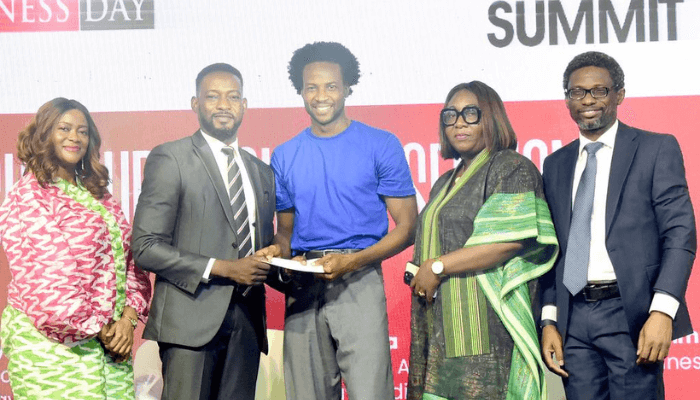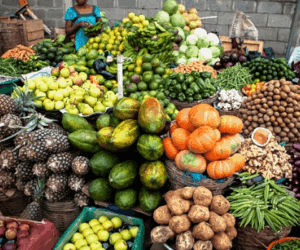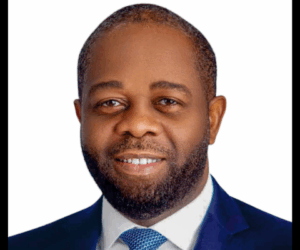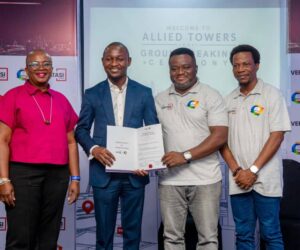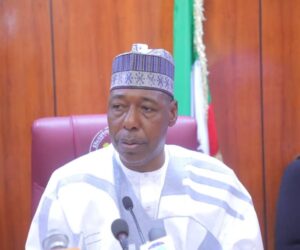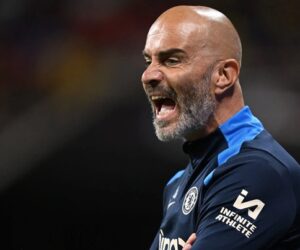L-R: Linda Ochugbua, manager, digital advert, BusinessDay Media Limited; Lolade Akinmurele, editor, BusinessDay; Chekwas Okafor, founder/CEO, Onchek (Merok T-Shirt)/winner, Pitch your Business; Ijeoma Ude, executive director, sales and marketing, BusinessDay Media Limited; and Oluwatoyin Edu, executive director, risk management and technology, Bank of Industry, during the presentation of 1milion naira cheque to the winner of Pitch your Business, at the BusinessDay Go Local Summit 2025, in Lagos. Pic by David Apara
When Chekwas Okafor stepped on stage to claim the ₦1,000,000 Go Local Summit prize, 18th November 2025, he wasn’t just winning a cash award – he was validating a turn in his life’s mission.
As the founder of ONCHEK and its manufacturing arm Merok, Okafor is building more than a T-shirt brand: he’s building a future where Nigeria’s cotton, labour, and industrial capacity come full circle.
A Vision Rooted in Service
Okafor, educated in the U.S., with a background in manufacturing, first launched ONCHEK as a luxury African fashion marketplace. But he soon realised that sourcing and production inconsistencies were hampering the brands he’d set out to uplift. In 2019, he pivoted ONCHEK into a fully integrated textile and garment business.
That pivot led to Merok: a brand of plain high-quality T-shirts that are 100% made in Nigeria, using Nigerian cotton and labour. His motivation, as he told BusinessDay, is deeply practical and patriotically rooted: “I want to contribute meaningfully to Nigeria’s development by building a company that creates jobs at scale.”
Building at Scale – and with Real Efficiency
Okafor’s strategy is bold: manufacturing is labour-intensive, making it capable of absorbing talent at all skill levels. He explains that ONCHEK’s T-shirt capacity now stands at 200,000 units per month, despite operating with just 30 sewing machines, a feat made possible by workflow optimisation, high utilisation, and strong production planning.
This capacity feeds directly into Merok’s mission: to make consistent, affordable, and locally produced basics. According to their website, Merok’s T-shirts are made from 100% cotton (with their grey variant at 85% cotton and 15% polyester), and are built with durability in mind, double-needle seams, taped shoulders, and a tubular fit. Users report that their colour fastness is excellent and shrinkage is limited, making them ideal for everyday wear or bulk printing.
Read also: Logistics, energy costs stall Nigeria’s ‘Go Local’ ambition
A Local Supply Chain That Defies the Status Quo
One of Merok’s most courageous bets is on local sourcing. Okafor told BusinessDay that ONCHEK is vertically integrated: from regional cotton growers to local knitting, dyeing, cutting, sewing, and finishing operations in Lagos.
This level of backward integration isn’t just about production; it’s about value retention. By keeping the entire process within Nigeria, ONCHEK avoids many of the costs, freight, customs, and currency risk that burden importers.
In a 2023 interview, Okafor went further: he argued that what many see as the problem, cheap imports, is only a symptom of a deeper challenge. The real issue, he says, is the inefficiency in local production. His answer: Build factories, invest in systems, and show that “made in Nigeria” can compete on cost and quality.
The Market & the Mission
Okafor made it clear that Merok isn’t a niche/elevated fashion brand; it’s a mass-market play. He sees a massive opportunity: Nigeria imports billions of dollars’ worth of textiles every year, and Merok’s lean operations enable it to price below many Indian and Chinese imports.
Okafor highlighted his ambition to expand beyond T-shirts. Merok plans to produce “other mass-market basics such as 100% cotton underwear and essential everyday wear” for Nigeria and the West African region.
Their distribution strategy is hybrid: Merok sells both B2B (bulk, institutional) and via retail/distributor channels. On their frequently asked questions (FAQ), they note that a distributor must order at least 3,000 pieces per month, signalling serious scale.
Challenges, Resilience & System Change
Okafor is unflinching about the barriers. Power outages, infrastructure gaps, and policy neglect remain real. BusinessDay quoted him saying that local textile revival won’t happen just through protectionism; there must be efficiency gains.
Still, ONCHEK is building around what Nigeria can do now. He shared with BusinessDay how their internal efficiencies, from operations culture to systems, help buffer the realities of the external environment.
The Go Local Summit Win: What It Means
Winning the ₦1,000,000 Go Local Summit prize isn’t just a financial windfall for Merok; it’s validation. It underscores that the summit’s agenda, local value retention, industrialisation, and consumption, aligns deeply with Okafor’s mission. This prize amplifies his voice and gives him another platform to push for systemic change.
Lessons for Entrepreneurs
Okafor offered wisdom for young Nigerian founders:
Consistency compounds: He emphasised the long game. “Things take time… bigger goals take even more time.”
Build around your strengths: By focusing on a labour-intensive business like garment manufacturing, he’s aligning his model with national potential.
Vertical integration matters: Controlling the supply chain (cotton → yarn → fabric → garment) isn’t just strategic, it’s transformative.
Be mission-driven but business-savvy: For Okafor, this isn’t charity. He understands profit, scale, and sustainability, but his North Star is social impact.
Why Chekwas Okafor’s Merok Is a Model for Nigeria’s Industrial Renaissance
Okafor’s journey with Merok and ONCHEK isn’t just about T-shirts; it’s a blueprint.
It challenges the myth that Nigeria can’t manufacture competitively.
It demonstrates how digital business models (OKNECHK’s early marketplace) can evolve into industrial businesses.
It shows that rebuilding local textiles is not only possible, but scalable, sustainable, and in tune with national development goals.
As he told BusinessDay: “I believe Nigeria can clothe Nigeria.” Thanks to Okafor’s leadership, Merok might just be one of the most powerful ways that belief becomes reality.

